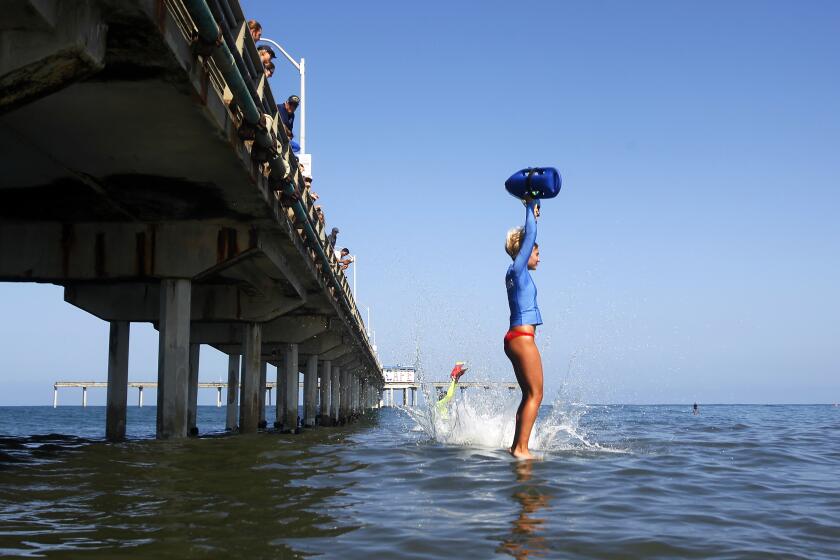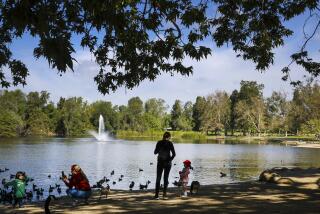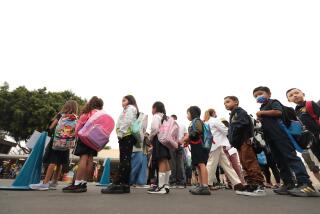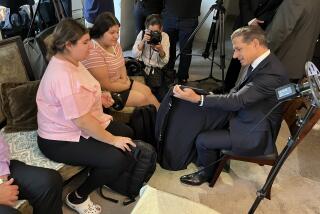A lifeline for working parents, L.A. County day camps struggle to adapt to new rules
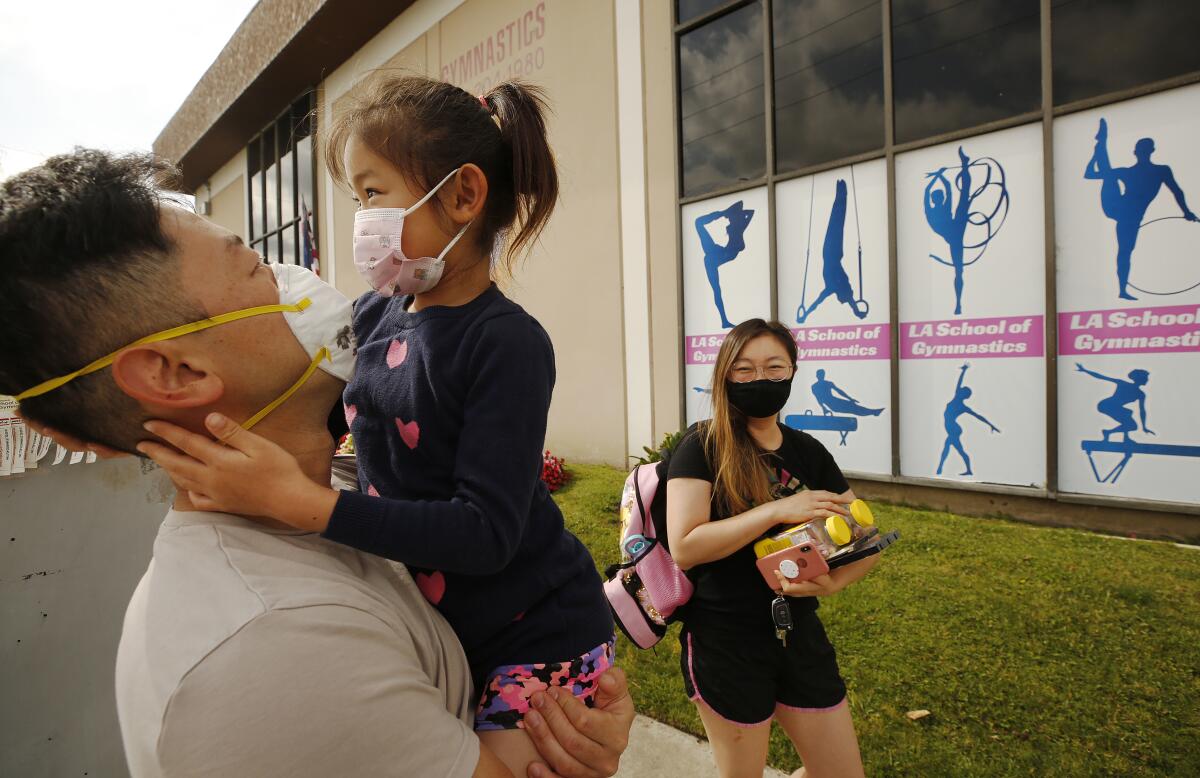
Samantha “Sammie” Chou showed up to the first day of camp at L.A. Gymnastics in Culver City on Wednesday wearing a glittery new unicorn backpack, neon tumbling shorts and a petal pink surgical mask spotted with cartoon owls.
“After a week or a month, I’m going to second grade,” the 6-year-old said, betraying both a child’s idiosyncratic perception of time and the temporal limbo families like hers have faced since schools closed in mid-March. For months, her parents, Shawn Chou and Jennifer Lee, tried to fill the gaps left by piano and theater and dance and jujitsu, bingeing on Zoom play dates and racing to keep up with her demanding dual-language immersion program.
But with schools out for the summer and industries statewide opening up, both are now expected back at work.
“For our situation, camps are invaluable — we can’t live without them,” said Chou, a filmmaker and producer. “It’s actually a lifesaver for us. I don’t know what we’d do without it.”
Across California, camp will look different than it has in years past. Masks will be everywhere. Shared snacks will be banned. There will be no field trips, no clap games, no capture the flag.
But for many working families, those things don’t really matter as long as summer camp serves its primary function: child care. Providing that care in compliance with ever-evolving state and local public health guidelines, however, has proved a dizzying task for camp operators — particularly in Los Angeles County, where reopening has been tempered by ongoing deaths and a rise in new coronavirus cases.
“Marin County was way ahead of us; they opened their day camps already. [But] L.A. County was much more cautious,” said Helen Hernandez, director of parks and recreation for the city of Baldwin Park and a board member at the California Park and Recreation Society, a nonprofit industry network. “There’s 90-something cities in L.A. County that are working together to be together on the same page” with new safety protocols.
Typically, Baldwin Park offers day camp for about 150 kids a week, as well as about 25 counselors in training. The program runs from 6 a.m. to 6 p.m. and costs $130 a week — one of the most affordable camps in the region.
“Our community is a working community; people do have to be at work at 6:30 a.m. — some parents even ask if we can open at 5:30,” Hernandez said. “Generally we have a waiting list, because our camp is pretty reasonable.”
But with all the new rules, she said opening was impossible.
“It’s a barrage of so many things,” Hernandez said. “Every kid would need their own ball, their own jump rope, their own hula hoop. The playgrounds are still not open, so there’s no outdoor play with the playgrounds. You can’t play bingo; you don’t play Monopoly, checkers, Jenga. Even a walk to the fire department is out because the firefighters are exposed. All these things that are traditionally low-cost for us, we can’t do.”
Parks departments and private camps across the state have spent weeks swapping symptom screening tools, resources and liability wavers in an attempt to adapt to the new reality. But between a limited roster of activities and reduced staffing ratios, tight restrictions on space and an exponential increase in the cost of materials, many have canceled or moved online for the summer.
“That’s what they’re all kind of wrangling with,” said Sarah Auerswald of Moms L.A., which curates detailed information on dozens of local summer camps every year. “You either can’t afford to run because there aren’t enough kids there, or you have to make it more expensive to pay for it. That’s just the balance sheet, right?”
Indeed, in the days since California’s Department of Public Health released its long-awaited day camp guidelines, which went into effect June 12, camps that had vowed they would open suddenly said they could not. Others that had already canceled for the season abruptly reversed course, some despite having issued refunds to families who had signed up. Sleep-away camps have still not received any guidance.
“Everybody’s like, ‘What’s the plan?’ There’s a lot of plans,” said Dan Pardo of the YMCA of Metropolitan Los Angeles, which typically runs day camps for 4,000 to 5,000 children a week in the summer. “We had a lot of people reaching out to us because they are thinking, ‘What am I doing for day care this summer? Who’s watching my kids while I’m back at work?’”
In May, Pardo was confident YMCA camps would open. But almost as soon as the state guidelines were released in June, the nonprofit announced that many could not.
“It really has been the state taking the lead on when and how these are going to be opened, and the counties are following suit from there,” said Matthew Duarte, executive director of the California Assn. of Recreation and Park Districts.
Many in L.A. described the decision not to open as a snowball effect of rules and costs.
“Our county is sort of different than everyone else,” Auerswald said. “The county health department and the city, those are the people who are saying yes you can [open] if you follow the rules.”
Most California counties have adopted the state guidelines as their own. But L.A. County’s guidelines, which were released June 11, are in some cases more stringent. City rules can be more restrictive still.
“You hear about what people are and are not doing based on what county they’re in,” said Stephanie Martinez, recreation services manager for West Hollywood. “Because our city continues to be under a state of local emergency, that limits us” too.
It also matters where camps are held inside a given city. Los Angeles Unified School District campuses, which host camps every summer, remain closed. County beaches, too, were briefly ruled off-limits for day camp operators. In May, weeks before state or local summer camp guidelines were unveiled, the Department of Beaches and Harbors said it would probably not issue beach camps permits for the summer at all.
Long Beach, Huntington Beach, Newport Beach and San Clemente are still waiting to see whether the program is feasible amid the coronavirus.
“It was going so quickly that no sooner had we put out that letter to our operators than we heard there could be guidance for summer camps,” said department spokeswoman Carol Baker. “It involves children, so obviously we need to be very careful and cautious.”
For camp owners, though, the move felt capricious — particularly after it was reversed.
“This whole thing has been really frustrating from the beginning,” said Sina Monjazeb, owner and director of Sandy Days Kids Camp at Will Rogers State Beach, which is now slated to open in early July. “Just in the L.A. area there’s probably at least a dozen beach camps that have been affected.”
Chou said he researched dozens of camps last summer before choosing the ones Samantha would attend. Since the spring, he has been inundated with updates from those organizations — camps ready to open, then canceled, then moved online or delayed.
“What we found was the camps say, ‘We’re open! Oh, but we’re not sure,’ and then they change and reverse course and say, ‘We’re open again,’” he said.
Despite demand, experts said many families remain deeply divided about whether to send kids to camp at all.
“We actually conducted a survey with our participants and I think a lot of parents and guardians are just not ready to send their children back,” Martinez said.
For others, summer camp now feels like a litmus test: Can children really practice physical distancing? Will they wear masks all day long? Can safety precautions be scaled? If it can’t happen at camp, how will it work out with school?
“We may be holding out hope that school is going to start again in the fall no problem,” Auerswald said. With so many fits and starts opening camps, “there’s a crack in that armor.”
More to Read
Start your day right
Sign up for Essential California for news, features and recommendations from the L.A. Times and beyond in your inbox six days a week.
You may occasionally receive promotional content from the Los Angeles Times.

